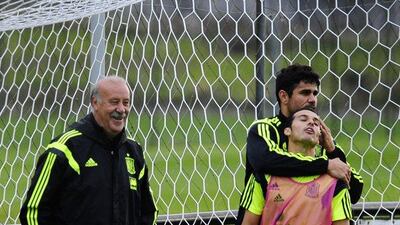Eras do not tend to end quietly. That is the problem with greatness. The real achievers are not allowed to slide unobtrusively into the background.
It was never an option for Spain, even before the result that reverberated around the football world, Friday's 5-1 loss to the Netherlands.
Their past feats, their unparalleled record of winning three consecutive major tournaments in the modern era, meant this World Cup would be part of a legacy project: triumph and their status as the greatest international team would be almost inarguable.
Click here to visit The National’s dedicated Wold Cup 2014 landing page
For many, that mantle rests with Brazil, winners of three World Cups out of four between 1958 and 1970, and the last country to retain it.
Yet as Spain were skewered in Salvador, the defending champions they resembled were not the Brazil team of 1962, who had almost certainly improved in four years, but the France side of 2002, stunned and unable to cope with unexpected setbacks.
France were the last dominant European side, winners of world and continental championships, and arrived in South Korea a dozen years ago as favourites.
They departed without scoring, let alone winning. They seemed a team who had believed their own publicity, one who had ignored the passage of time and the debilitating effects of ageing.
Which brings us to Spain, for whom defeat against Chile on Wednesday would almost certainly result in ignominious elimination.
“Life or death,” Cesc Fabregas called it.
Perhaps it is a simplification to say his teammates looked too old and too slow in the second half against the Netherlands, that they had declined without realising it. Perhaps it is just wrong.
“To think that this generation of players is finished is a little exaggerated,” Xabi Alonso said.
Like France 12 years ago, their squad is packed with World Cup winners – 16 in Spain’s case. But while success can breed stability, it can produce stasis. Selection can be determined by past deeds, by reputation, rather than the here and now.
Spain’s storied greats arrived with a starting 11 boasting an average of 77 caps apiece. Iker Casillas has 155 alone, but the 155th was the most painful. An apologetic Casillas accepted that it was the worst performance of his career. But he has only been Real Madrid’s second-choice goalkeeper for the past 18 months. Now, with both Victor Valdes and David de Gea injured, Spain have to stick with their captain.
Dropping Casillas at an earlier date would have entailed being ahead of the curve, rather than behind it. Suddenly, Spain look complacent.
Now, after the certainties of old were demolished by the Dutch, Vicente del Bosque faces decisions: whether to promote Javi Martinez, Pedro Rodriguez and Koke, the closest to the next generation, or whether to persist with the perennials and dismiss the Dutch disaster as one rogue result.
It can happen. Manchester United lost 6-1 to Manchester City in 2011 and still finished the season with 89 points. Yet the league format means defeats, however heavy, aren’t as damaging.
While this may be the group stage, Spain are already in knockout football. Admittedly, they were four years ago, too, following their opening loss to Switzerland, and they have an impeccable record of not conceding, let alone losing, when the stakes were highest.
Yet that was when they were at their peak, before Xavi was 34, Alonso approaching 33 and Sergio Ramos, while only 28, seemed to be treading in treacle as the older Arjen Robben accelerated past him. Now Spain’s personnel and philosophy are both under the microscope.
Tiki-taka has generated eulogies and attacks alike. Spain’s football was always too bloodless for some who place great value individualism, and the revival of counter-attacking football, marked by penetration and pace, was typified by the Netherlands.
Ironically, Real and Atletico Madrid, Uefa Champions League and Primera Liga winners, respectively, proved Spanish sides do not need possession to prosper.
Del Bosque may have ditched his false nine to bring in an authentic striker, Diego Costa, but the national team have been more inflexible. That can be how empires end, when ideas spread elsewhere and the old order resist them. Or perhaps Spain can reassert their authority against a younger, quicker Chile team.
If they don’t, however, then their glory days have been consigned to the past in the space of one, extraordinary week.
sports@thenational.ae
Follow our sports coverage on twitter at @SprtNationalUAE


